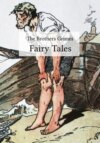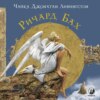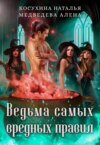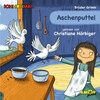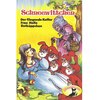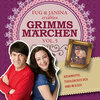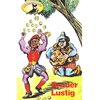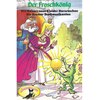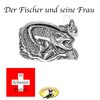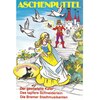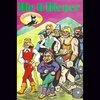Читать книгу: «Fairy Tales», страница 3
BRIAR ROSE
A king and queen once upon a time reigned in a country a great way off, where there were in those days fairies. Now this king and queen had plenty of money, and plenty of fine clothes to wear, and plenty of good things to eat and drink, and a coach to ride out in every day: but though they had been married many years they had no children, and this grieved them very much indeed. But one day as the queen was walking by the side of the river, at the bottom of the garden, she saw a poor little fish, that had thrown itself out of the water, and lay gasping and nearly dead on the bank. Then the queen took pity on the little fish, and threw it back again into the river; and before it swam away it lifted its head out of the water and said, ‘I know what your wish is, and it shall be fulfilled, in return for your kindness to me - you will soon have a daughter.’ What the little fish had foretold soon came to pass; and the queen had a little girl, so very beautiful that the king could not cease looking on it for joy, and said he would hold a great feast and make merry, and show the child to all the land. So he asked his kinsmen, and nobles, and friends, and neighbours. But the queen said, ‘I will have the fairies also, that they might be kind and good to our little daughter.’ Now there were thirteen fairies in the kingdom; but as the king and queen had only twelve golden dishes for them to eat out of, they were forced to leave one of the fairies without asking her. So twelve fairies came, each with a high red cap on her head, and red shoes with high heels on her feet, and a long white wand in her hand: and after the feast was over they gathered round in a ring and gave all their best gifts to the little princess. One gave her goodness, another beauty, another riches, and so on till she had all that was good in the world.
Just as eleven of them had done blessing her, a great noise was heard in the courtyard, and word was brought that the thirteenth fairy was come, with a black cap on her head, and black shoes on her feet, and a broomstick in her hand: and presently up she came into the dining-hall. Now, as she had not been asked to the feast she was very angry, and scolded the king and queen very much, and set to work to take her revenge. So she cried out, ‘The king’s daughter shall, in her fifteenth year, be wounded by a spindle, and fall down dead.’ Then the twelfth of the friendly fairies, who had not yet given her gift, came forward, and said that the evil wish must be fulfilled, but that she could soften its mischief; so her gift was, that the king’s daughter, when the spindle wounded her, should not really die, but should only fall asleep for a hundred years.
However, the king hoped still to save his dear child altogether from the threatened evil; so he ordered that all the spindles in the kingdom should be bought up and burnt. But all the gifts of the first eleven fairies were in the meantime fulfilled; for the princess was so beautiful, and well behaved, and good, and wise, that everyone who knew her loved her.
It happened that, on the very day she was fifteen years old, the king and queen were not at home, and she was left alone in the palace. So she roved about by herself, and looked at all the rooms and chambers, till at last she came to an old tower, to which there was a narrow staircase ending with a little door. In the door there was a golden key, and when she turned it the door sprang open, and there sat an old lady spinning away very busily. ‘Why, how now, good mother,’ said the princess; ‘what are you doing there?’ ‘Spinning,’ said the old lady, and nodded her head, humming a tune, while buzz! went the wheel. ‘How prettily that little thing turns round!’ said the princess, and took the spindle and began to try and spin. But scarcely had she touched it, before the fairy’s prophecy was fulfilled; the spindle wounded her, and she fell down lifeless on the ground.
However, she was not dead, but had only fallen into a deep sleep; and the king and the queen, who had just come home, and all their court, fell asleep too; and the horses slept in the stables, and the dogs in the court, the pigeons on the house-top, and the very flies slept upon the walls. Even the fire on the hearth left off blazing, and went to sleep; the jack stopped, and the spit that was turning about with a goose upon it for the king’s dinner stood still; and the cook, who was at that moment pulling the kitchen-boy by the hair to give him a box on the ear for something he had done amiss, let him go, and both fell asleep; the butler, who was slyly tasting the ale, fell asleep with the jug at his lips: and thus everything stood still, and slept soundly.
A large hedge of thorns soon grew round the palace, and every year it became higher and thicker; till at last the old palace was surrounded and hidden, so that not even the roof or the chimneys could be seen. But there went a report through all the land of the beautiful sleeping Briar Rose (for so the king’s daughter was called): so that, from time to time, several kings’ sons came, and tried to break through the thicket into the palace. This, however, none of them could ever do; for the thorns and bushes laid hold of them, as it were with hands; and there they stuck fast, and died wretchedly.
After many, many years there came a king’s son into that land: and an old man told him the story of the thicket of thorns; and how a beautiful palace stood behind it, and how a wonderful princess, called Briar Rose, lay in it asleep, with all her court. He told, too, how he had heard from his grandfather that many, many princes had come, and had tried to break through the thicket, but that they had all stuck fast in it, and died. Then the young prince said, ‘All this shall not frighten me; I will go and see this Briar Rose.’ The old man tried to hinder him, but he was bent upon going.
Now that very day the hundred years were ended; and as the prince came to the thicket he saw nothing but beautiful flowering shrubs, through which he went with ease, and they shut in after him as thick as ever. Then he came at last to the palace, and there in the court lay the dogs asleep; and the horses were standing in the stables; and on the roof sat the pigeons fast asleep, with their heads under their wings. And when he came into the palace, the flies were sleeping on the walls; the spit was standing still; the butler had the jug of ale at his lips, going to drink a draught; the maid sat with a fowl in her lap ready to be plucked; and the cook in the kitchen was still holding up her hand, as if she was going to beat the boy.
Then he went on still farther, and all was so still that he could hear every breath he drew; till at last he came to the old tower, and opened the door of the little room in which Briar Rose was; and there she lay, fast asleep on a couch by the window. She looked so beautiful that he could not take his eyes off her, so he stooped down and gave her a kiss. But the moment he kissed her she opened her eyes and awoke, and smiled upon him; and they went out together; and soon the king and queen also awoke, and all the court, and gazed on each other with great wonder. And the horses shook themselves, and the dogs jumped up and barked; the pigeons took their heads from under their wings, and looked about and flew into the fields; the flies on the walls buzzed again; the fire in the kitchen blazed up; round went the jack, and round went the spit, with the goose for the king’s dinner upon it; the butler finished his draught of ale; the maid went on plucking the fowl; and the cook gave the boy the box on his ear.
And then the prince and Briar Rose were married, and the wedding feast was given; and they lived happily together all their lives long.
THE DOG AND THE SPARROW
A shepherd’s dog had a master who took no care of him, but often let him suffer the greatest hunger. At last he could bear it no longer; so he took to his heels, and off he ran in a very sad and sorrowful mood. On the road he met a sparrow that said to him, ‘Why are you so sad, my friend?’ ‘Because,’ said the dog, ‘I am very very hungry, and have nothing to eat.’ ‘If that be all,’ answered the sparrow, ‘come with me into the next town, and I will soon find you plenty of food.’ So on they went together into the town: and as they passed by a butcher’s shop, the sparrow said to the dog, ‘Stand there a little while till I peck you down a piece of meat.’ So the sparrow perched upon the shelf: and having first looked carefully about her to see if anyone was watching her, she pecked and scratched at a steak that lay upon the edge of the shelf, till at last down it fell. Then the dog snapped it up, and scrambled away with it into a corner, where he soon ate it all up. ‘Well,’ said the sparrow, ‘you shall have some more if you will; so come with me to the next shop, and I will peck you down another steak.’ When the dog had eaten this too, the sparrow said to him, ‘Well, my good friend, have you had enough now?’ ‘I have had plenty of meat,’ answered he, ‘but I should like to have a piece of bread to eat after it.’ ‘Come with me then,’ said the sparrow, ‘and you shall soon have that too.’ So she took him to a baker’s shop, and pecked at two rolls that lay in the window, till they fell down: and as the dog still wished for more, she took him to another shop and pecked down some more for him. When that was eaten, the sparrow asked him whether he had had enough now. ‘Yes,’ said he; ‘and now let us take a walk a little way out of the town.’ So they both went out upon the high road; but as the weather was warm, they had not gone far before the dog said, ‘I am very much tired - I should like to take a nap.’ ‘Very well,’ answered the sparrow, ‘do so, and in the meantime I will perch upon that bush.’ So the dog stretched himself out on the road, and fell fast asleep. Whilst he slept, there came by a carter with a cart drawn by three horses, and loaded with two casks of wine. The sparrow, seeing that the carter did not turn out of the way, but would go on in the track in which the dog lay, so as to drive over him, called out, ‘Stop! stop! Mr Carter, or it shall be the worse for you.’ But the carter, grumbling to himself, ‘You make it the worse for me, indeed! what can you do?’ cracked his whip, and drove his cart over the poor dog, so that the wheels crushed him to death. ‘There,’ cried the sparrow, ‘thou cruel villain, thou hast killed my friend the dog. Now mind what I say. This deed of thine shall cost thee all thou art worth.’ ‘Do your worst, and welcome,’ said the brute, ‘what harm can you do me?’ and passed on. But the sparrow crept under the tilt of the cart, and pecked at the bung of one of the casks till she loosened it; and then all the wine ran out, without the carter seeing it. At last he looked round, and saw that the cart was dripping, and the cask quite empty. ‘What an unlucky wretch I am!’ cried he. ‘Not wretch enough yet!’ said the sparrow, as she alighted upon the head of one of the horses, and pecked at him till he reared up and kicked. When the carter saw this, he drew out his hatchet and aimed a blow at the sparrow, meaning to kill her; but she flew away, and the blow fell upon the poor horse’s head with such force, that he fell down dead. ‘Unlucky wretch that I am!’ cried he. ‘Not wretch enough yet!’ said the sparrow. And as the carter went on with the other two horses, she again crept under the tilt of the cart, and pecked out the bung of the second cask, so that all the wine ran out. When the carter saw this, he again cried out, ‘Miserable wretch that I am!’ But the sparrow answered, ‘Not wretch enough yet!’ and perched on the head of the second horse, and pecked at him too. The carter ran up and struck at her again with his hatchet; but away she flew, and the blow fell upon the second horse and killed him on the spot. ‘Unlucky wretch that I am!’ said he. ‘Not wretch enough yet!’ said the sparrow; and perching upon the third horse, she began to peck him too. The carter was mad with fury; and without looking about him, or caring what he was about, struck again at the sparrow; but killed his third horse as he done the other two. ‘Alas! miserable wretch that I am!’ cried he. ‘Not wretch enough yet!’ answered the sparrow as she flew away; ‘now will I plague and punish thee at thy own house.’ The carter was forced at last to leave his cart behind him, and to go home overflowing with rage and vexation. ‘Alas!’ said he to his wife, ‘what ill luck has befallen me! My wine is all spilt, and my horses all three dead.’ ‘Alas! husband,’ replied she, ‘and a wicked bird has come into the house, and has brought with her all the birds in the world, I am sure, and they have fallen upon our corn in the loft, and are eating it up at such a rate!’ Away ran the husband upstairs, and saw thousands of birds sitting upon the floor eating up his corn, with the sparrow in the midst of them. ‘Unlucky wretch that I am!’ cried the carter; for he saw that the corn was almost all gone. ‘Not wretch enough yet!’ said the sparrow; ‘thy cruelty shall cost thee thy life yet!’ and away she flew.
The carter seeing that he had thus lost all that he had, went down into his kitchen; and was still not sorry for what he had done, but sat himself angrily and sulkily in the chimney corner. But the sparrow sat on the outside of the window, and cried ‘Carter! thy cruelty shall cost thee thy life!’ With that he jumped up in a rage, seized his hatchet, and threw it at the sparrow; but it missed her, and only broke the window. The sparrow now hopped in, perched upon the window-seat, and cried, ‘Carter! it shall cost thee thy life!’ Then he became mad and blind with rage, and struck the window-seat with such force that he cleft it in two: and as the sparrow flew from place to place, the carter and his wife were so furious, that they broke all their furniture, glasses, chairs, benches, the table, and at last the walls, without touching the bird at all. In the end, however, they caught her: and the wife said, ‘Shall I kill her at once?’ ‘No,’ cried he, ‘that is letting her off too easily: she shall die a much more cruel death; I will eat her.’ But the sparrow began to flutter about, and stretch out her neck and cried, ‘Carter! it shall cost thee thy life yet!’ With that he could wait no longer: so he gave his wife the hatchet, and cried, ‘Wife, strike at the bird and kill her in my hand.’ And the wife struck; but she missed her aim, and hit her husband on the head so that he fell down dead, and the sparrow flew quietly home to her nest.
THE TWELVE DANCING PRINCESSES
There was a king who had twelve beautiful daughters. They slept in twelve beds all in one room; and when they went to bed, the doors were shut and locked up; but every morning their shoes were found to be quite worn through as if they had been danced in all night; and yet nobody could find out how it happened, or where they had been.
Then the king made it known to all the land, that if any person could discover the secret, and find out where it was that the princesses danced in the night, he should have the one he liked best for his wife, and should be king after his death; but whoever tried and did not succeed, after three days and nights, should be put to death.
A king’s son soon came. He was well entertained, and in the evening was taken to the chamber next to the one where the princesses lay in their twelve beds. There he was to sit and watch where they went to dance; and, in order that nothing might pass without his hearing it, the door of his chamber was left open. But the king’s son soon fell asleep; and when he awoke in the morning he found that the princesses had all been dancing, for the soles of their shoes were full of holes. The same thing happened the second and third night: so the king ordered his head to be cut off. After him came several others; but they had all the same luck, and all lost their lives in the same manner.
Now it chanced that an old soldier, who had been wounded in battle and could fight no longer, passed through the country where this king reigned: and as he was travelling through a wood, he met an old woman, who asked him where he was going. ‘I hardly know where I am going, or what I had better do,’ said the soldier; ‘but I think I should like very well to find out where it is that the princesses dance, and then in time I might be a king.’ ‘Well,’ said the old dame, ‘that is no very hard task: only take care not to drink any of the wine which one of the princesses will bring to you in the evening; and as soon as she leaves you pretend to be fast asleep.’
Then she gave him a cloak, and said, ‘As soon as you put that on you will become invisible, and you will then be able to follow the princesses wherever they go.’ When the soldier heard all this good counsel, he determined to try his luck: so he went to the king, and said he was willing to undertake the task.
He was as well received as the others had been, and the king ordered fine royal robes to be given him; and when the evening came he was led to the outer chamber. Just as he was going to lie down, the eldest of the princesses brought him a cup of wine; but the soldier threw it all away secretly, taking care not to drink a drop. Then he laid himself down on his bed, and in a little while began to snore very loud as if he was fast asleep. When the twelve princesses heard this they laughed heartily; and the eldest said, ‘This fellow too might have done a wiser thing than lose his life in this way!’ Then they rose up and opened their drawers and boxes, and took out all their fine clothes, and dressed themselves at the glass, and skipped about as if they were eager to begin dancing. But the youngest said, ‘I don’t know how it is, while you are so happy I feel very uneasy; I am sure some mischance will befall us.’ ‘You simpleton,’ said the eldest, ‘you are always afraid; have you forgotten how many kings’ sons have already watched in vain? And as for this soldier, even if I had not given him his sleeping draught, he would have slept soundly enough.’
When they were all ready, they went and looked at the soldier; but he snored on, and did not stir hand or foot: so they thought they were quite safe; and the eldest went up to her own bed and clapped her hands, and the bed sank into the floor and a trap-door flew open. The soldier saw them going down through the trap-door one after another, the eldest leading the way; and thinking he had no time to lose, he jumped up, put on the cloak which the old woman had given him, and followed them; but in the middle of the stairs he trod on the gown of the youngest princess, and she cried out to her sisters, ‘All is not right; someone took hold of my gown.’ ‘You silly creature!’ said the eldest, ‘it is nothing but a nail in the wall.’ Then down they all went, and at the bottom they found themselves in a most delightful grove of trees; and the leaves were all of silver, and glittered and sparkled beautifully. The soldier wished to take away some token of the place; so he broke off a little branch, and there came a loud noise from the tree. Then the youngest daughter said again, ‘I am sure all is not right - did not you hear that noise? That never happened before.’ But the eldest said, ‘It is only our princes, who are shouting for joy at our approach.’
Then they came to another grove of trees, where all the leaves were of gold; and afterwards to a third, where the leaves were all glittering diamonds. And the soldier broke a branch from each; and every time there was a loud noise, which made the youngest sister tremble with fear; but the eldest still said, it was only the princes, who were crying for joy. So they went on till they came to a great lake; and at the side of the lake there lay twelve little boats with twelve handsome princes in them, who seemed to be waiting there for the princesses.
One of the princesses went into each boat, and the soldier stepped into the same boat with the youngest. As they were rowing over the lake, the prince who was in the boat with the youngest princess and the soldier said, ‘I do not know why it is, but though I am rowing with all my might we do not get on so fast as usual, and I am quite tired: the boat seems very heavy today.’ ‘It is only the heat of the weather,’ said the princess: ‘I feel it very warm too.’
On the other side of the lake stood a fine illuminated castle, from which came the merry music of horns and trumpets. There they all landed, and went into the castle, and each prince danced with his princess; and the soldier, who was all the time invisible, danced with them too; and when any of the princesses had a cup of wine set by her, he drank it all up, so that when she put the cup to her mouth it was empty. At this, too, the youngest sister was terribly frightened, but the eldest always silenced her. They danced on till three o’clock in the morning, and then all their shoes were worn out, so that they were obliged to leave off. The princes rowed them back again over the lake (but this time the soldier placed himself in the boat with the eldest princess); and on the opposite shore they took leave of each other, the princesses promising to come again the next night.
When they came to the stairs, the soldier ran on before the princesses, and laid himself down; and as the twelve sisters slowly came up very much tired, they heard him snoring in his bed; so they said, ‘Now all is quite safe’; then they undressed themselves, put away their fine clothes, pulled off their shoes, and went to bed. In the morning the soldier said nothing about what had happened, but determined to see more of this strange adventure, and went again the second and third night; and every thing happened just as before; the princesses danced each time till their shoes were worn to pieces, and then returned home. However, on the third night the soldier carried away one of the golden cups as a token of where he had been.
As soon as the time came when he was to declare the secret, he was taken before the king with the three branches and the golden cup; and the twelve princesses stood listening behind the door to hear what he would say. And when the king asked him. ‘Where do my twelve daughters dance at night?’ he answered, ‘With twelve princes in a castle under ground.’ And then he told the king all that had happened, and showed him the three branches and the golden cup which he had brought with him. Then the king called for the princesses, and asked them whether what the soldier said was true: and when they saw that they were discovered, and that it was of no use to deny what had happened, they confessed it all. And the king asked the soldier which of them he would choose for his wife; and he answered, ‘I am not very young, so I will have the eldest.’ - And they were married that very day, and the soldier was chosen to be the king’s heir.

